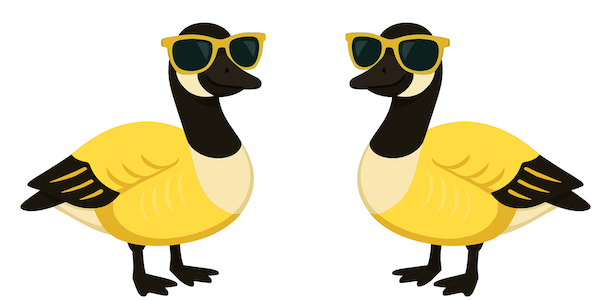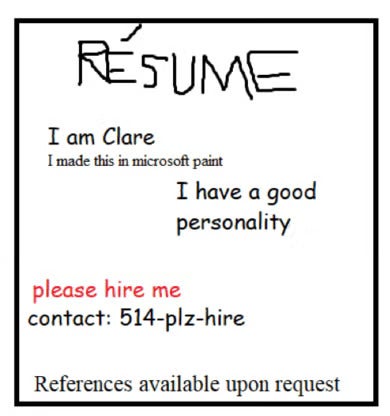
Written by Clare (she/her) and Chloe (she/her), students
Putting time and effort into creating a great résumé while you’re still in high school is a great way to get ahead in your professional and academic journey.
When it comes time to apply for a summer job, your first co-op job, or an internship, employers will nearly always require you to submit a résumé.
Even though you may not have had any work experience yet, not to worry — being involved in school activities and/or volunteering can be a great starting point for your résumé. A lot of people think high school experiences are not interesting (or relevant) to employers, but the truth is, they can help make a résumé that sets you apart from your peers! And that's really your goal: to show employers how your qualifications can help them and their organization.
To make you feel better, in high school, Clare's résumé looked something like this.

So even if yours looks like Clare's did, don't worry! After working on my résumé for a few years now, we’ve pulled together some tips on how you can build up your résumé before starting university.
If it’s relevant and true, include it
Lots of people with limited work experience end up creating a very empty résumé because they feel there’s nothing to write. But a résumé isn’t just about paid work experience!
A résumé should give an employer a good idea of who you are as a person (and as a future employee) – and this is definitely not limited to any previous jobs you’ve had. You should put anything on there that you feel represents you well. Volunteer experience is great, and so is a school leadership position, but these aren’t the only experiences that can go on a résumé.
If you’re a member of a school club, team, or community group, this will give employers an idea of who you are. While it might feel silly to include "member of board game club" on your résumé, an employer reading this now knows that you’re a problem solver, are used to competitive environments, and are able to commit to weekly meetings. And maybe, if luck is on your side, your interviewer could have a passion that's similar to yours, allowing you to connect with them on a more personal level!
Make sure you can prove your points
Let’s say you have an interest in machine learning. Maybe you’ve never studied the topic in school, but you took a free online introductory course, and you feel like you have a good grasp on the general concepts. You can put this on your résumé! This goes back to what we said before: if what you’re saying is true, include it. A bullet point saying "interested in machine learning with a basic understanding of the subject" is true and will intrigue an employer, especially if it's something that shows you can take the initiative.
On the flip side, make sure you have examples to go along with everything you include on your résumé. You don't want to risk having an employer ask about a task or hobby and you're not able to explain it.
Sections of a résumé
Depending on how old you are and the type of job you're applying for, the sections on your résumé can differ. However, the following sections are common for high school students:
- Your name and contact information (so employers can call you to set up an interview)
- Skills and qualifications (which can be a great way of highlighting what you can do if you haven't had many/any previous jobs)
- Previous work experience (if you haven't had a job, see previous point — extracurriculars like clubs can be put here!)
- Volunteer experience
- Education
Some people highlight their career goals or include a quick summary of themselves, e.g., hard worker with an interest in learning, problem solver with creative thinking skills, and/or good communicator who likes working with people.
In your "skills and qualifications" section, brag a little! Maybe you don’t have any official qualifications, but you definitely have skills. You can include anything that’s true about yourself and that's relevant to the job.
Here's an extra tip, take a look at the job posting! The job posting will often list the skills that the employer is looking for, and then you can base your list of skills off of that.
Example of a 'skills and qualifications' section
- Excellent verbal and written communication skills
- Great attention to detail
- Proficient with Microsoft Office, social media, and creating videos
- Excellent time management and organizational skills
- Fluent in French
It's important to note that while you want to flesh your points out with enough detail, you also don't want to pad them with unnecessary detail. Aim for four or five points maximum, and try to keep each of them in one line.
Once you get to Waterloo, you can meet with a career advisor to help identify your skills and qualifications.

Explain why something is important
Remember when we said that when you write "member of board game club" on your résumé, the employer will know that you're a problem solver, you're used to competitive environments, and you're able to commit to weekly club meetings? Well, this might not always be true. There is a possibility that the employer has never played a board game in their life, and therefore, won’t understand the level of commitment it takes to maintain your position in the club. This is why you have to tell them.
Whenever you put something on your résumé, explain why it is important. Include the details on how this makes you a better employee: what skills you’ve gained, what you learned, what kind of commitment you made, and anything else you think is important.
For example, under "Work experience," you can outline your role as a member of the board game club and explain its importance in one detailed, but concise, sentence:
- Collaborated with team members to develop and implement in-game strategies, leading to improved team performance and a series of victories in local competitions.
If you’re having trouble coming up with these details, go through this scenario in your head. Imagine I told you that you’ll no longer be able to attend your club meetings (or whatever else you are doing) unless you were able to convince me of how you are growing as a person because of it. What would you say to me? Write that down!
The format is more important than you think
When creating a résumé, pay close attention to how you format and structure it. Here are some tips you can follow to format your résumé properly:
- Put your name, contact information, and other details at the top of the page.
- Label your sections clearly and order them in a way that makes sense.
- List your experiences from most to least relevant, in chronological order.
- Outline any points with bullet points. Be sure not to exceed four or five points if you keep them in one line. If your points go over a line, stick closer to three points.
- Expand the margins. A good résumé is concise, and ideally, doesn’t go over a page. Play around with margins to see how you can maximize the space of the page to fit in all relevant details.
- Pay attention to white space. Note the white space between your sections and keep them consistent — this helps clarify the points on your résumé and overall gives it a clean look.
Tip: avoid dividing your résumé into two columns. Many employers use applicant tracking systems (ATS) to scan résumés. To successfully pass this process, organize the information on your résumé into one wide, easy-to-read column.
So how do you actually format a résumé?
You can use résumé templates online to get inspiration or ideas, but it’s best to create your résumé from the heart! You can ensure the formatting of your résumé is correct and customize it to reflect who you are as both an individual and a potential employee.
Here's Chloe's example of what a well-formatted résumé looks like.
John Doe
[Your Address] | [City, Province, Postal Code] | [Email address] | [LinkedIn URL]
Education
[High school name]-[City, Province] Start Date - Graduation Date
- GPA (optional)
Skills and Qualifications
- Communication: strong verbal and written communication skills
- Teamwork: able to work collaboratively with diverse groups.
- Problem-solving: adept at analyzing complex situations and finding effective solutions.
- Time-management: effectively manage multiple tasks.
Experience
Board Game Club Member | [Club]-[City, Province] Start date - Present
- Collaborated with team members to develop and implement in-game strategies, leading to a series of victories in local tournaments.
- Organized and facilitated regular club meetings, promoting an upbeat, inclusive environment.
- Managed inventory and organization of board games, ensuring games were accessible for all members.
Customer Service Assistant | [Company]-[City, Province] Start date - End date
- Provided exceptional customer service by answering customer inquiries and concerns to ensure overall customer satisfaction.
- Processed transactions through use of cash register, handling up to [$ amount] daily.
- Trained new staff members, contributing to the overall success and efficiency of the team.
Volunteer Experience
Event Coordinator | [Organization]-[City, Province] Start date - End date
- Organized fundraising events, including coordinating volunteers and managing event logistics to ensure smooth execution.
- Raised [$ amount] in donations, exceeding the target goal by 20%.
Customize, customize, customize!
Don’t think your résumé is set in stone once you've finished. It’s easier to update it a little bit every once in a while, than have to do a huge refresh every time you start applying to jobs.
Also, you don’t have to use the same résumé for every application! For example, if you’re applying to a graphic design firm, you'll definitely want to emphasize your creative skills (maybe link to a website that shows off your work).
However, if you’re applying for a financial position, your creative experiences are still important (and it shows the employer you’re well-rounded), but you’ll probably want to highlight your technical skills more.
In either case, you'll want to use your résumé to highlight skills or knowledge that are relevant to the job you're applying to.
So, I hope these tips help to get you started! Your first year of university can be very busy and will go by quickly, so you’ll be glad to have already started the process of creating a great résumé for co-op or other career opportunities.
And remember, in building a résumé you'll definitely go through a trial and error process, but eventually you’ll have a shining document that shows off all your best qualities.
Building a great résumé takes time! Focus on the process of gaining skills and experience as you move into this next chapter of your life — your résumé will grow with you.
Once you're a Waterloo student
Our on-campus Centre for Career Development offers workshops and events such as "Résumé Tips: Thinking Like an Employer" and "From Apps to Interviews: Your Crash Course to Employment" to help you perfect your résumé. You can also meet individually with a career advisor to review your résumé or work on your interview skills.

Related articles

Why and how to use LinkedIn in high school
If you’re 16 or older, the pearly gates of this networking heaven are wide open and it may just help you achieve your university and career goals. Why should you use it? How should you use it? We’re glad you asked.

How to get a summer job
If you're considering working during your summer break, here are some tips on when, where, and how to get a good summer job.

Ultimate guide: Tips for Grade 12 success
As university students, we remember what our final year of high school was like. There was so much to think about regarding our future, but there was also a lot of pressure to make memories with our high school friends. It can be overwhelming! That's why we've compiled a list of tips of how to be successful in school while enjoying your senior year and preparing for what comes next.

